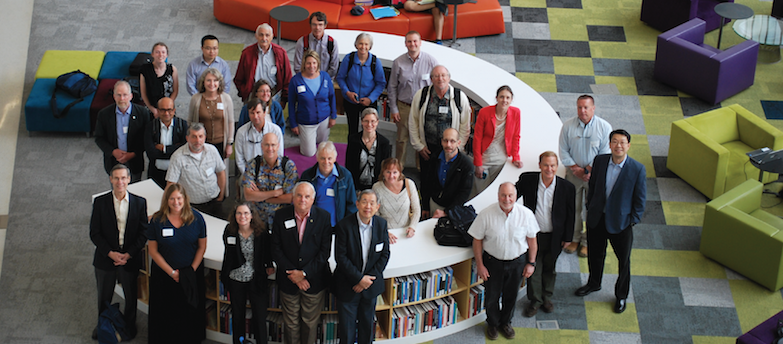We thank everyone who attended the SECOORA 2016 Annual Meeting at North Carolina State University! The three-day meeting focused on identifying opportunities for collaborations and highlighting SECOORA accomplishments. The conversation focused on big data and ecological interactions in the southeast (jump to meeting presentations).
Thank you to Ruoying He and Jennifer Warrilow for hosting the meeting at North Carolina State University.
Major Outcomes
Over 60 participants worked together to identify ways to take the productive step toward strengthening SECOORA. Below are the major outcomes from the meeting. We are energized to work with volunteers to complete the tasks listed.
- Elect New Board Members
- Mitch Roffer (Roffer’s Ocean Fishing Forecasting Service, Inc.): Industry/Private Sector Seat
- Rick DeVoe (SC Sea Grant Consortium): Public Agencies/ Non-Profit/ Other Sector Seat
- Lisa Adams (Kennesaw State University): At Large Seat- GA Seat
- Quinton White (Jacksonville University): At Large Seat- FL Seat
- Michael Crosby (Mote): Sustaining Member Seat
- Design targeted member benefit packages for different user groups
- Establish a SECOORA student fellowship with the assistance of an Ad Hoc Committee
- Form an Ad-Hoc Committee to help plan a fundraising campaign in conjunction with the a the SECOORA 10-Year Anniversary celebration
- Develop a new RCOOS Plan with the assistance of experts in the our region
- Update the SECOORA Data Portal based on feedback
- Consider hosting a panel on Understanding Ecological Interactions in the Gulf of Mexico
Day 1: Board and Members Meetings
Board Meeting
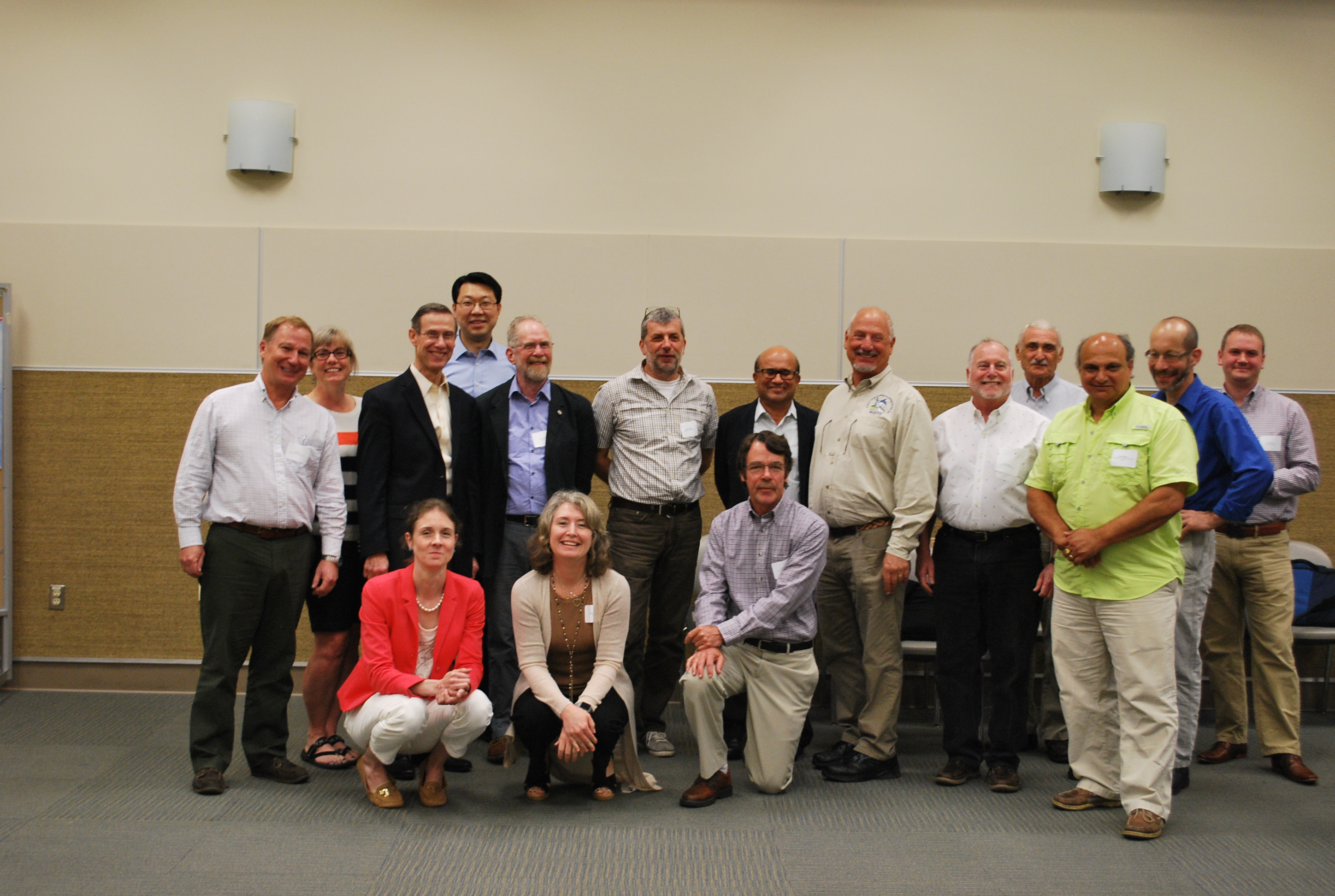
Pictured are SECOORA Board Members with SECOORA Staff
Recently SECOORA Board and staff adopted a Strategic Plan for 2016-2020. The plan identifies our mission, core values, 5-year vision, strategic priority goals and strategies to achieve those goals.
Board members worked in teams to brainstorm tools for implementing key aspects of the plan. The activities are summarized below:
- New Members
Member benefits packages should be created for specific groups, such as anglers, shipping industry, environmental data providers, ocean weather companies, and environmental engineering consulting firms. Two additional ideas explored were creating student/youth membership options and investigating/documenting the return on investment for the various membership levels. - Establish a Student Fellowship
A student fellowship is important for training the next generation of ocean experts and increasing the visibility of SECOORA. Connecting with another organization (such as MTS) to host a student fellowship is one option for leveraging the SECOORA resources available for this effort. - Plan a Fundraising Campaign
A fundraising campaign should support a compelling story and increase awareness of SECOORA. It is important to leverage our 501 c (3) status and involve Board members in the campaign. - Plan a 10-year Anniversary Event
In 2017 SECOORA will be celebrating our 10-year anniversary. SECOORA can use this milestone to host an event or fundraise. One opportunity explored is hosting a race of drifters in the Gulf Stream, from somewhere in Florida to Cape Hatteras. If you would like to participate in the planning process or have any ideas for an event please contact Abbey Wakely, abbey@secooraorgpact.wpengine.com.
Member’s Business Meeting
Josie Quintrell, IOOS Association Director, provided a congressional update and discussed the IOOS appropriations request for FY 17, reauthorization of the ICOOS act, and planning messages for the next administration. For the first time in five years, the Senate and the House both increased the IOOS regional line $2 million above the President’s request.
Debra Hernandez, SECOORA Executive Director, provided an update on new members, the 2015 Annual Report, and SECOORA’s Strategic Plan. SECOORA funds 20 in situ-stations, 15 High Frequency Radars, and 5 modeling projects. Inclusiveness and diversity was raised during the general discussion.
SECOORA would like to extend a warm welcome to our newly elected, and returning, Board members:
- Mitch Roffer (Roffer’s Ocean Fishing Forecasting Service, Inc.): Industry/Private Sector Seat
- Rick DeVoe (SC Sea Grant Consortium): Public Agencies/ Non-Profit/ Other Sector Seat
- Lisa Adams (Kennesaw State University): At Large Seat- GA Seat
- Quinton White (Jacksonville University): At Large Seat- FL Seat
- Michael Crosby (Mote): Sustaining Member Seat
Conrad Lautenbacher (GeoOptics), Roger Pugliese (SAFMC) and Nick Shay (UM RSMAS) were recognized and praised for their contributions and time spent serving on the SECOORA Board. They are pictured above.
The day ended with a tour of the NCSU’s James B. Hunt Jr. Library and a social atNCSU’s Lonnie Poole Clubhouse.
Day 2: Stakeholder Meeting
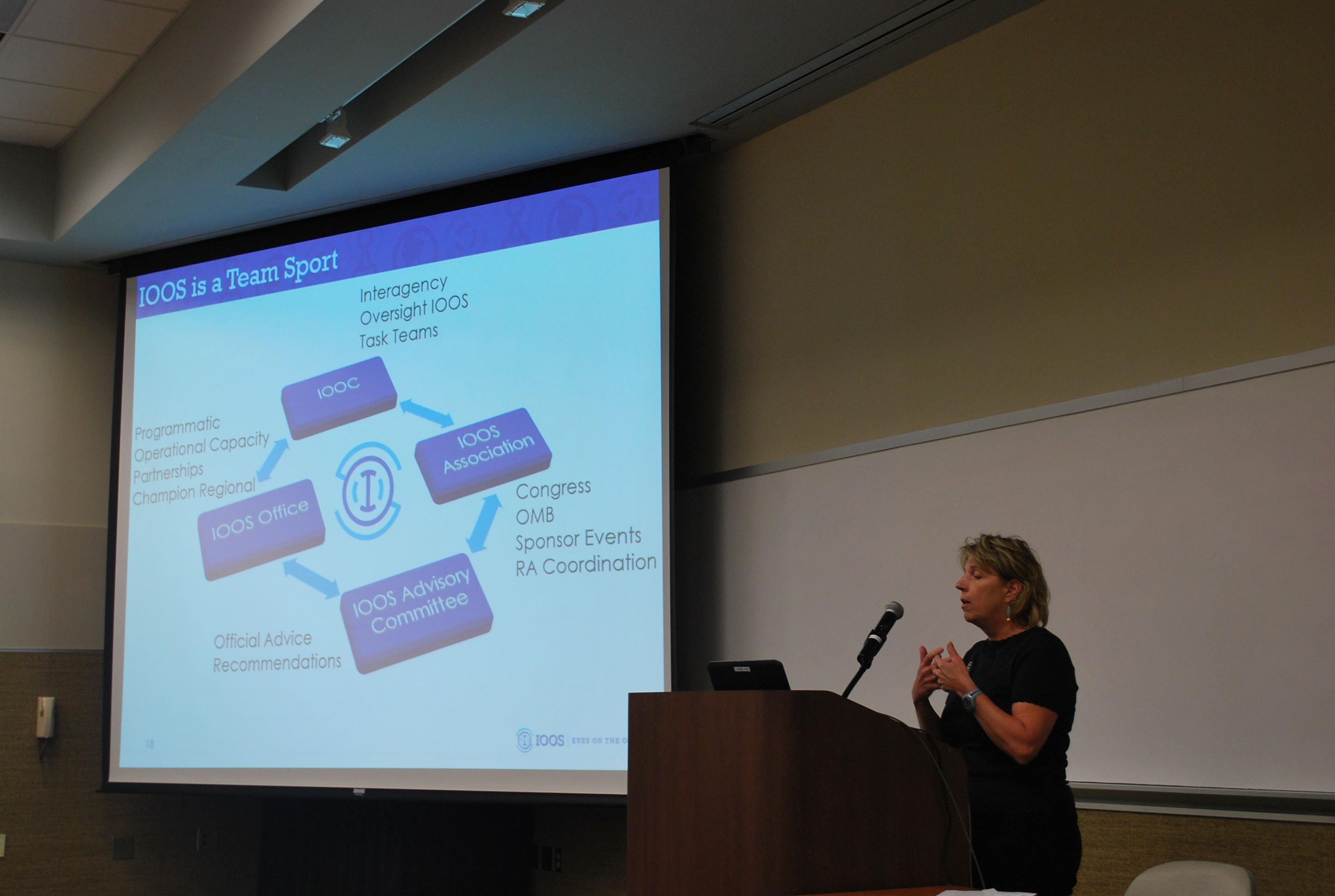
Zdenka Willis (US IOOS Executive Director) highlighted the many achievements accomplished by the US IOOS, Regional Associations and SECOORA over the past year. The Ocean Enterprise Study completed by US IOOS and NOAA analyzed US business activity in ocean measurement, observation and forecasting. What does the Ocean Enterprise and NFL have in common? Both are $7 billion industries. Other achievements include the awarding of the competitive five-year funding proposals, launch of a new IOOS logo and website, High Frequency Radar data being used by National Weather Service forecasters, the Marine Biodiversity Observation Network and much more.
Debra Hernandez (SECOORA Executive Director) provided an overview of accomplishments including a 57% increase in website views, SOCAN state of the science webinar series, new interns, data management transition, and more.
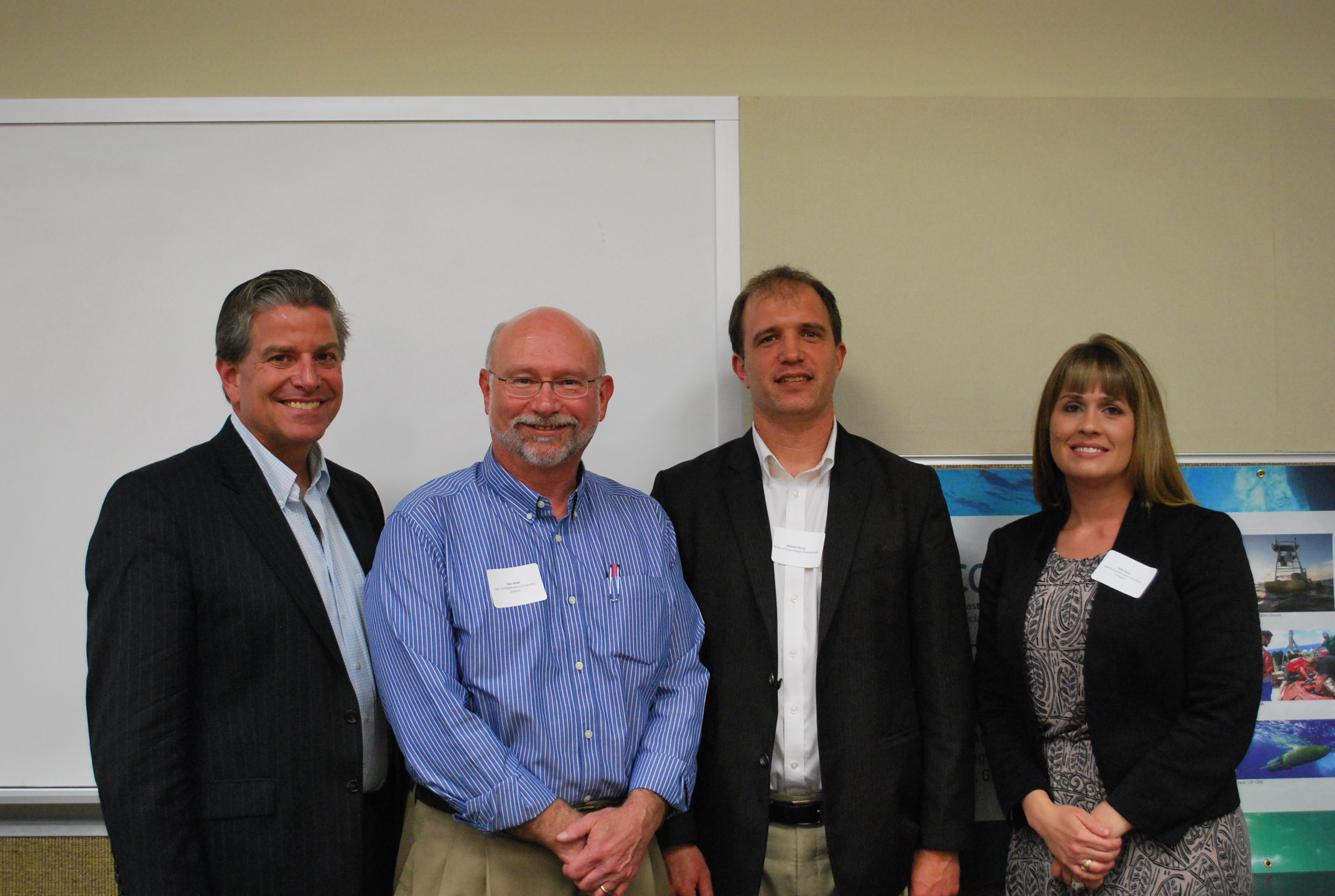
Big Data Panel: From left to right: Ed Kearns, Stanley Ahalt, Michael Rasser, Ruth Mullins Perry
Edward Kearns (NOAA’s National Centers For Environmental Information) opened the Big Data discussion with a presentation on the Challenges and Opportunities with NOAA’s Big Data Partnership. One of main problems with Big Data is supporting the labor necessary to steward and curate collections of data. It is estimated that 70% of the NCEI orders are coming from users who want to know the answer- not the data. The NOAA Big Data Partnership program is leveraging partnerships to bring vast information to the clouds, where both the public and industry can easily and equally access, explore, and create new products from it. Organizations they are working with areAmazon Web Services, Google Cloud Platform, IBM, Microsoft Corp., and the Open Cloud Consortium. Businesses (such as Amazon Web Services) take the free data and provide community free access in hopes users will compute the data on their platform (platform = data + processors + storage + apps). It is noted the industry value for adding NOAA Marine and other non-weather data needs to be identified.
The Big Data Panel featured industry, federal and academic perspectives on Big Data.
- Stanley C. Ahalt (Renaissance Computing Institute) discussed RENCI’s contributions to the National Water Model and the South Big Data Hub funded by the National Science Foundation. The South Big Data Hub works with environmental sciences and health / biosciences data. There is an opportunity for SECOORA to be a big data hub member.
- Ruth Mullins Perry (Shell Upstream Americas) recognized data sharing between offshore industry, stakeholders, private and public sectors needs to increase. All sectors have the same end goal: understanding the marine environment.
- Michael Rasser (Bureau of Ocean Energy Management) stated the challenge is making data discoverable and accessible. Data needs to be combined to deliver informational products. BOEM invests in passive acoustic monitoring. It would be helpful to have a community standard for acoustic data collection.
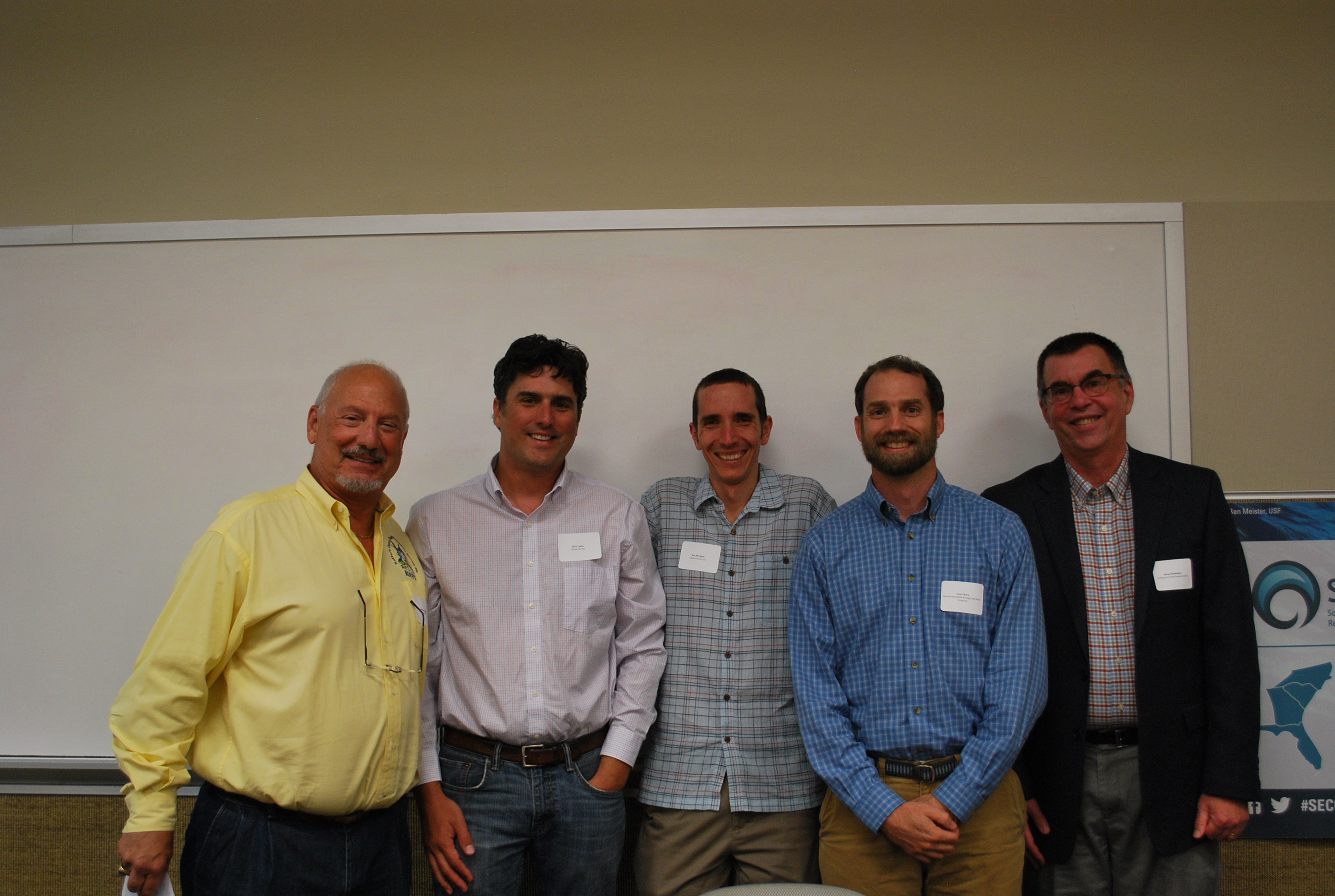
Pictured is the Ecological Interactions panel. From left to right: Mitchell Roffer, Chris Taylor, Rua Mordecai, Jesse Clearly, Gerard McMahon
Mitchell Roffer (ROFFS™) moderated the Understanding Ecological Interactions in the Southeastern U.S. Panel where partnership opportunities were explored. One major outcome was the agreement to exploit and integrate biological and physical data linkages.
- Gerard McMahon (Department of Interior Southeast Climate Science Center) presented the SECSC convenes conversations, builds the capacity of understanding, and provides decision-focused research based information. Of the six strategic science themes, Theme 5: “Impacts of climate Change on Coastal and near-shore environments”, is an area where SECOORA can get involved. One project is the Ridge to Reef Concept.
- Rua Mordecai (The South Atlantic Landscape Conservation Cooperative) explained SALCC collectively creates and implements a conservation blueprint that guides efforts to sustain natural and cultural resources. The organization requested monthly summaries of modeled data and a creative way to capture model uncertainty (i.e. using cellphone bars to depict the certainty of the models). Data gaps include monitoring across gradients, data integration across state lines and easy access to biological monitoring data.
- Chris Taylor (NOAA National Centers for Coastal Ocean Science) identified the ocean observation system is fragmented in the southeast resulting in limited information on large-scale patterns of environmental change. Data needs include improved ocean modeling to predict/map Gulf Stream dynamics including upwelling and bottom temperatures; a network of acoustics sensors for tracking species on the continental shelf; increased ocean/wave glider missions and more biological sensors on moorings.
- Jesse Cleary (Duke University) discussed regional species modeling and data integration. Data needs to improve cetacean model predictors include improved resolution and hindcast/forecasting. Jesse is part of the Marine life Data and Analysis Team (MDAT). MDAT works with Regional Planning Bodies to synthesize marine life data. A need identified is to extend MDAT to the southeast for biological data synthesis.
SECOORA unveiled their data portal at the meeting. Use the tool to explore, download and visualize ocean and coastal data in the Southeast US.Stay tuned for a cookbook of how to contribute data and a detailed tutorial. For now, please view this webinar to learn more or contact vembu@secooraorgpact.wpengine.com.
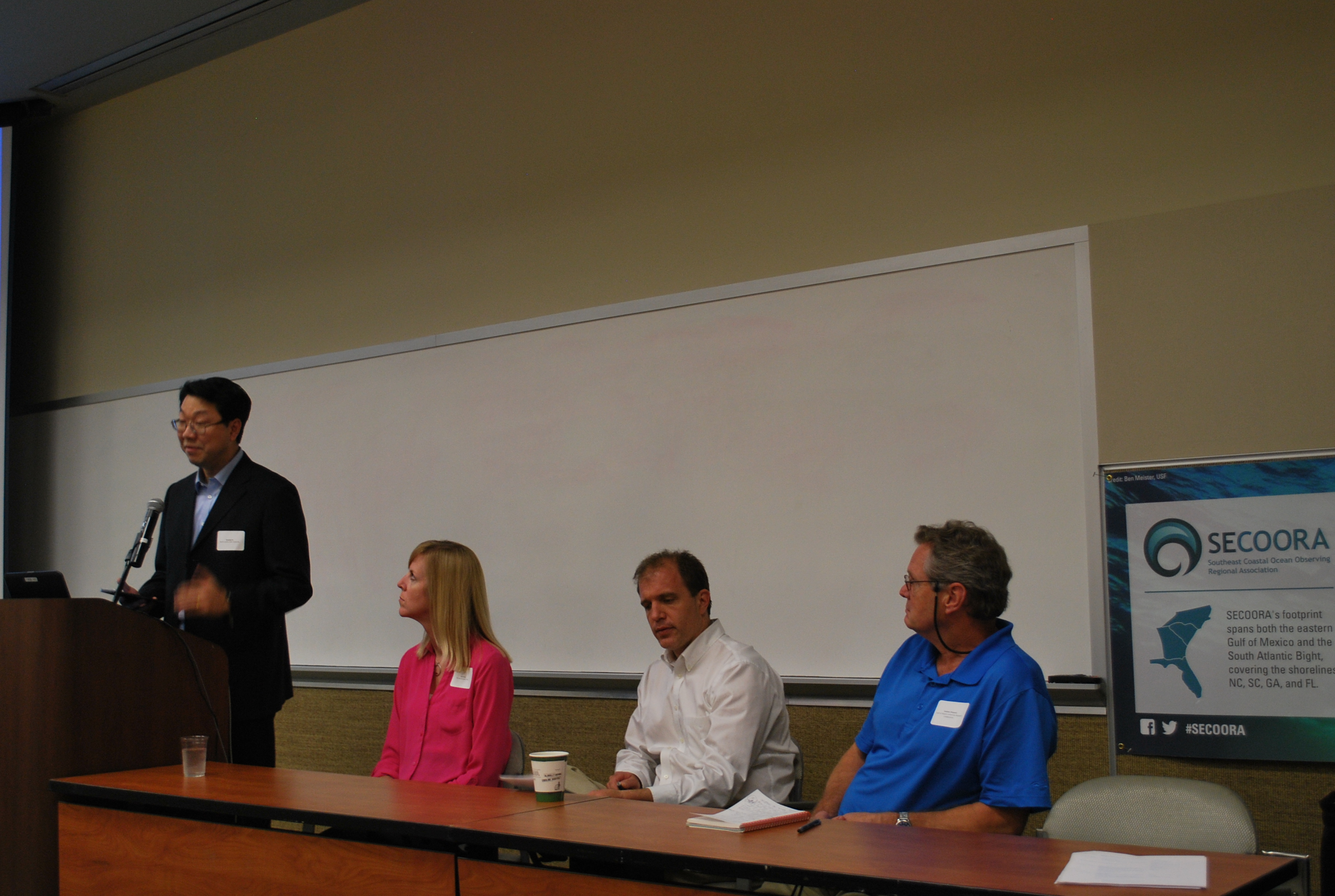
Program Managers Panel from left to right: Ruoying He, Lora Clarke, Michael Rasser, Andy Shepard
Ruoying He (NCSU) moderated the Program Managers Panel. SECOORA Members were given insight into potential future projects. Lora Clarke (PEW Charitable Trusts), Andy Shepard (FL RESTORE Act Centers of Excellence Program), and Michael Rasser (BOEM) presented on behalf of their organizations. The outcome of the conversation was to link observations with fisheries management activities. The Pew Charitable Trusts team in the Gulf and South Atlantic has a specific focus on fisheries management. The FL RESTORE Act Centers of Excellence Program is committed to making a comprehensive ecosystem monitoring program. BOEM is investing heavily in passive acoustics.
Day 3: Principal Investigator Meeting
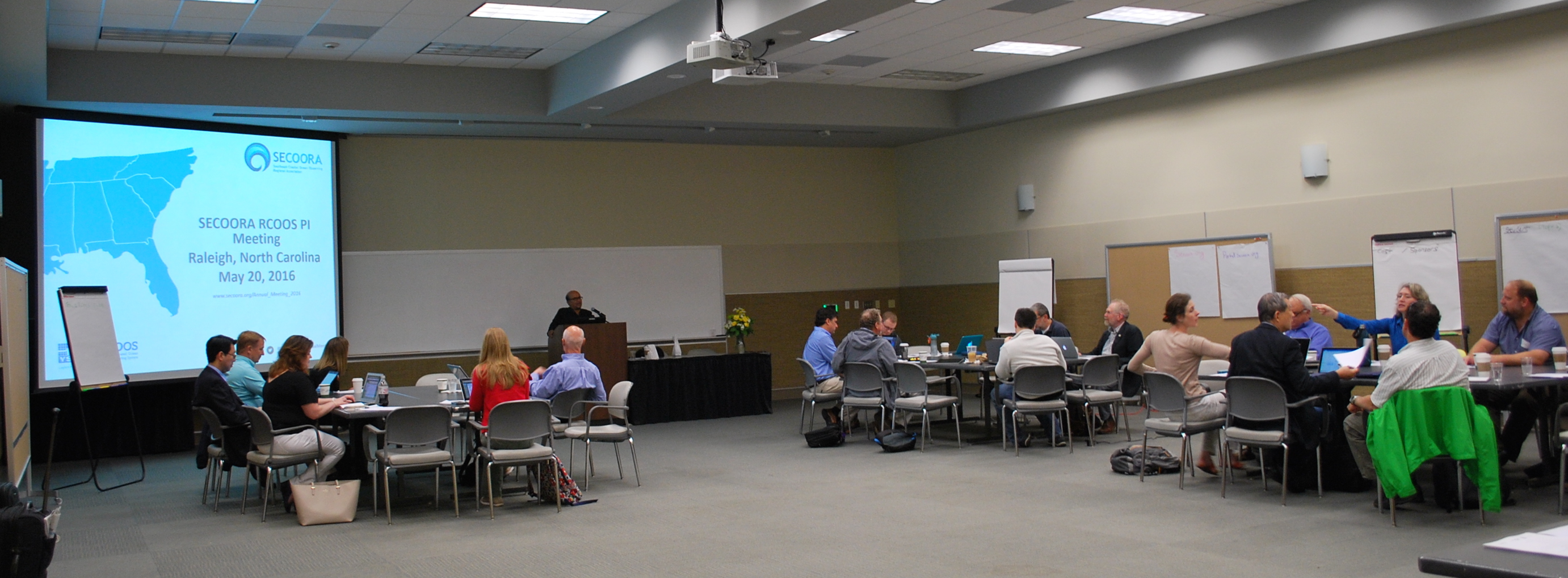
Vembu Subramanian (SECOORA) opened the meeting with an overview of SECOORA Regional Coastal Ocean Observing Projects. SECOORA was awarded a $20 million Cooperative Agreement for the next five years. Funding is awarded annually and is dependent on Congressional appropriations. With the $2.5M for this year, SECOORA will to continue existing operations and implement a new water quality station in South Carolina and support glider deployments in the Southeast.
Meeting attendees separated into three different groups to: 1) Gather input on revising SECOORA RCOOS Plan, 2) Gather input for improvements to SECOORA’s website and data portal, and 3) Explore options for establishing an annual SECOORA Student Fellowship. Check back for summaries of each session.
SECOORA PI and long-time Board Member, Bob Weisberg, attended the PI meeting on his birthday. We appreciate your dedication to SECOORA Dr. Weisberg!
Thank You Sponsors
SECOORA would like to thank the sponsors who generously supported the 2016 Annual Meeting. The meeting could not have been successful without them!
Gold Level Sponsor
Bronze Level Sponsor
Below are more photos from the meeting!
Pictured Above is Peter Spain at the Teledyne RDI Sponsor Booth
Pictured Above are SECOORA Members Jim Nelson (UGA SkIO) and George Sedberry (NOAA)
Pictured Above are SECOORA Members Lynn Leonard (UNCW) Rick DeVoe (SC Se Grant), Denise Sanger (SCDNR)
Pictured Above are the Meeting Participants
Pictured Above are Meeting Attendees Mike Muglia (NOAA) and Catherine Edwards (UGA SkIO)
Pictured Above are Michael Rasser (BOEM) and Peter Hamilton (Leidos)
IOOS Association Update and Congressional Outlook, Josie Quintrell, IOOS Association Director (coming soon)
State of US IOOS, Zdenka Willis, US IOOS Director
State of SECOORA, Debra Hernandez, SECOORA Executive Director
Big Data Panel
- Stanley C. Ahalt, Director, Renaissance Computing Institute (RENCI) University of North Carolina Chapel Hill
- Ruth Mullins Perry, Marine Science and Regulatory Policy Specialist, Shell Upstream Americas (please email Ruth.Perry@shell.com for the presentation)
- Michael Rasser, Marine Ecologist, Division of Environmental Sciences, Bureau of Ocean Energy Management (BOEM)
Understanding Ecological Interactions in the Southeastern U.S. Panel
- Gerard McMahon, Director, Department of Interior Southeast Climate Science Center
- Rua Mordecai, Science Coordinator, South Atlantic Landscape Conservation Cooperative
- Chris Taylor, National Centers for Coastal Ocean Science, NOAA’s Beaufort Laboratory
- Jesse Cleary, Marine Geospatial Ecology Lab, Nicholas School of the Environment, Duke University
SECOORA Data Portal Demonstration (portal.secoora.org), Kyle Wilcox, Axiom
Program Managers Open Mic Session
- Lora Clarke, Officer, US Oceans Southeast, The Pew Charitable Trusts
- Michael Rasser, Marine Ecologist, Division of Environmental Sciences, Bureau of Ocean Energy Management (BOEM)
Overview of SECOORA RCOOS Projects, Vembu Subramanian, SECOORA
Meeting Materials
Agenda: Board and Members Business Meetings, Wednesday May 18
Agenda: Stakeholder Meeting, Thursday May 19
Agenda: Principal Investigator, Meeting Friday May 20
SECOORA 2016 Committee Report
2015 Annual Report
SECOORA Strategic Plan 2016-2020
SECOORA Strategic Plan Framework Graphic
Related news
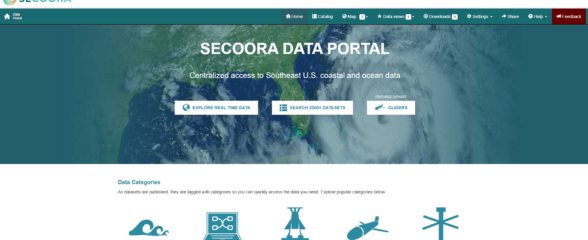
Webinar: SECOORA Data Portal Demo
Join us on Thursday, February 20, 2025 at 1:00 PM ET to learn more about the SECOORA Data Portal and how to navigate it. Axiom Data Science will be providing an overview of the portal, including how to search the Catalog and make a custom data view.
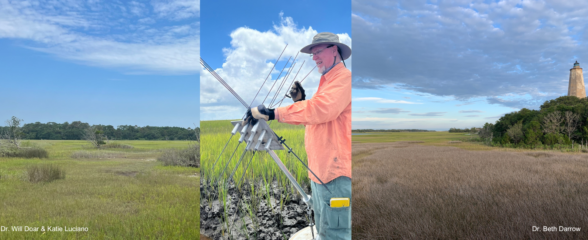
Meet the Winners of the Surface Elevation Table (SET) Call for Proposals
SECOORA hosted a request for proposals for the installation of new Surface Elevation Table (SET) stations or the reactivation of historic SET stations within the Southeast region. This opportunity covers the cost of materials and supplies for the stations. Meet the winners here!

Meet the Winners of the 2024 Vembu Subramanian Ocean Scholars Award
Four winners were selected for the Vembu Subramanian Ocean Scholars Award, which is an annual funding opportunity to support students and early career professionals to present their research at a conference or meeting.
